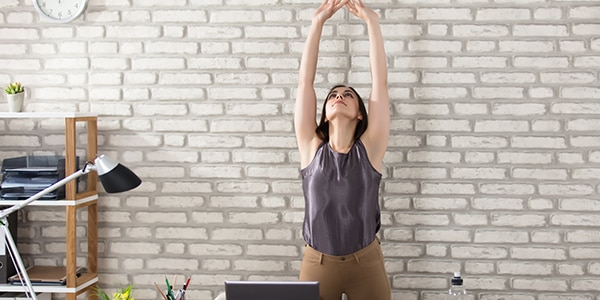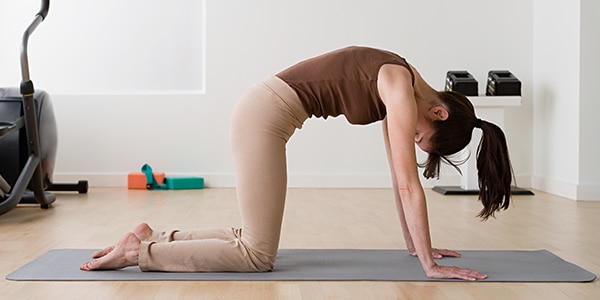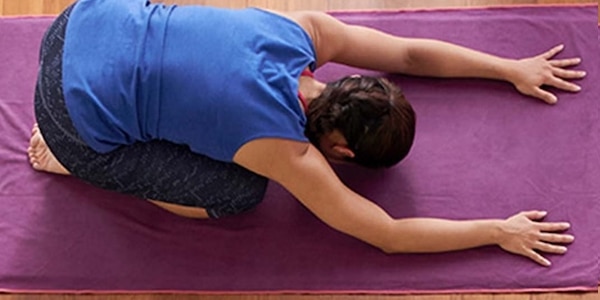It’s important to care for the whole you — mind, body, and spirit. And if you’ve been spending more time at home or are working from home, it’s even more important to get your body moving whenever possible.
Not only is movement great for your physical health, but it can also benefit your mental health. Studies have found that exercises like yoga may be helpful for depression, anxiety, or PTSD.* Plus, low-impact yoga poses can be easy to do when you have a few free moments to spare.
Here are some simple yoga moves to try that will keep your body moving throughout the day.

Mountain Pose (Tadasana)
- Stand with your feet shoulder-width apart and outstretch your arms.
- Lift both arms away from your sides and hold them in place when they’re about 12 inches away from your hips.
- As you settle into the pose, roll your shoulders back and tilt your chin slightly upwards.
- Take a deep breath while stretching your arms out as if someone were gently pulling down on your fingertips.
- Hold this pose for 5 deep breaths or for however long feels comfortable for you.

Upward Salute (Urdhva Hastasana)
- Start in Mountain Pose.
- Reach your arms up over your head and lengthen your body from toes to fingertips.
- Your face should be tilted upwards looking at your hands as you reach up for the sky.
- Hold this pose for 5 deep breaths or for however long feels comfortable for you.

Salutation Seal (Anjali Mudra)
- You can start this pose from either a seated or standing position.
- Raise your arms up and over your head, then press the palms of your hands together and bring them down to the center of your chest.
- Roll your shoulders back and take a few deep breaths.
- Hold this pose for 5 deep breaths or for however long feels comfortable for you.

Cow Face Pose (Gomukhasana)
- Start in the Mountain Pose position.
- With your hands at your side, move your right arm behind your back while also lifting your left arm up and over your head.
- Try to reach behind your back and grab the fingertips of each hand. If you can’t reach your fingertips, try holding onto a strap, belt, or towel.
- Once your hands are clasped together, roll your shoulders back and breathe deeply into this pose.
- Switch hands after a few breaths.

Cat Pose (Marjaryasana)
- Lower yourself to your hands and knees on a yoga mat or soft surface (like a carpet).
- Your hands should be shoulder-width apart and your knees should be hip-width apart, with the soles of your feet facing up.
- Keep your back straight — like a table — at the start of this pose.
- Gently curve your spine up into Cat Pose while letting your head hang down toward the floor.
- After a few breaths, you can try to either:
- Go back to a neutral straight back to rest.
- Move into Cow Pose by letting your belly button drop towards the ground while lifting your gaze up to the ceiling.

Child’s Pose (Balasana)
- Start on the ground in the Cat Pose.
- Using your hands as anchors, shift your hips back so that your stomach is resting on top of your legs.
- With your head pressed on the ground, stretch your hands out as far as you can reach while breathing deeply.
- Hold this pose for 5 deep breaths or for however long feels comfortable for you.
Learn more
For more wellness resources to support your total health, visit kp.org/selfcare.
